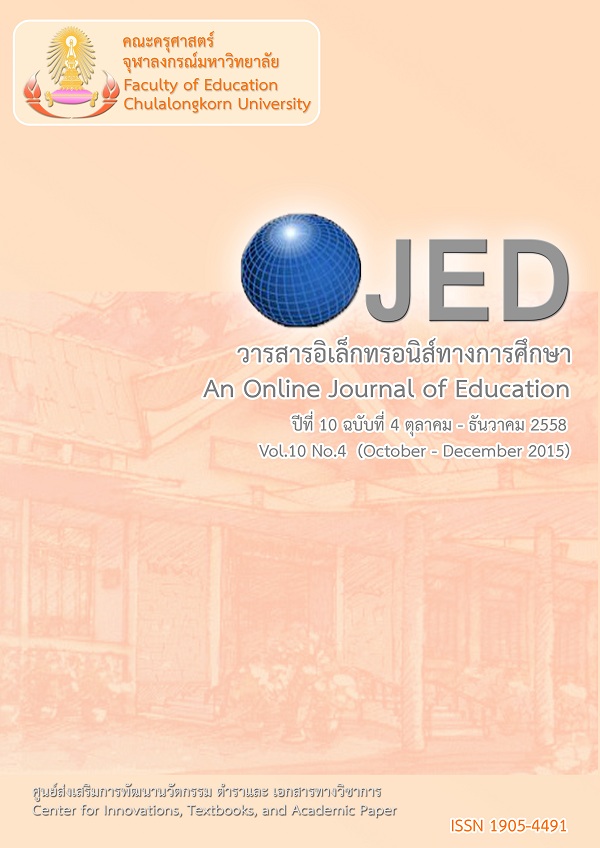การพัฒนาเครื่องมือประเมินความสามารถในการให้เหตุผลเชิงกรณีของนิสิตนักศึกษาครูโดยใช้เอ็มอีคิว และสคริปต์คอนคอร์แดนซ์
Keywords:
ความสามารถในการให้เหตุผลเชิงกรณี, เอ็มอีคิว, สคริปต์คอนคอร์แดนซ์, CASE-BASED REASONING, MODIFIED ESSAY QUESTION, SCRIPT CONCORDANCEAbstract
บทความนี้เป็นส่วนหนึ่งของงานวิจัยเรื่องการพัฒนาเครื่องมือประเมินความสามารถในการให้เหตุผลเชิงกรณีของนิสิตนักศึกษาครูโดยใช้เอ็มอีคิว (modified essay question: MEQ) และสคริปต์คอนคอร์แดนซ์ (script concordance)
มีวัตถุประสงค์ คือเพื่อพัฒนาและตรวจสอบคุณภาพเครื่องมือประเมินความสามารถในการให้เหตุผลเชิงกรณี เก็บข้อมูล
เชิงคุณภาพด้วยวิธีการสัมภาษณ์แบบไม่เป็นทางการ (informal interview) กับครูโรงเรียนระดับประถมศึกษาจำนวน
5 คน เพื่อศึกษาปัญหาที่เกิดขึ้นในชีวิตประจำวันของนักเรียนระดับประถมศึกษา วิธีการแก้ปัญหาและสร้างเกณฑ์การให้คะแนนด้วยวิธีการสนทนากลุ่ม (focus group) ครูจำนวน 10 คน โดยนำข้อมูลที่ได้มาพัฒนาเป็นเครื่องมือประเมินความสามารถในการให้เหตุผลเชิงกรณี ด้วยปัญหาในสถานการณ์ อาจมาจากหลายสาเหตุซึ่งมีความไม่แน่นอนและต้องใช้การตัดสินใจในการแก้ปัญหา เครื่องมือประเภทข้อสอบแบบเลือกตอบหรือมาตรประมาณค่าจึงไม่เหมาะสมกับการประเมินตัวแปรนี้ ในทางแพทยศาสตรศึกษามีเครื่องมือประเมินความสามารถในการให้เหตุผลที่มีความไม่แน่นอนเข้ามาเกี่ยวข้องกับการตัดสินใจ เรียกว่า สคริปต์คอนคอร์แดนซ์แต่เครื่องมือชนิดนี้ยังไม่เปิดโอกาสให้ผู้ตอบได้อธิบายเหตุผล จึงประยุกต์เข้ากับเอ็มอีคิวเพื่อช่วยอธิบายการแก้ปัญหาอย่างมีเหตุผลได้ชัดเจนยิ่งขึ้น โดยเก็บข้อมูลจากตัวอย่างวิจัยเป็นนิสิตชั้นปีที่ 4-5 คณะครุศาสตร์ จุฬาลงกรณ์มหาวิทยาลัย ตรวจสอบคุณภาพของแบบประเมินโดยการตรวจสอบความตรงตามเนื้อหา (content validity) โดยมีค่า IOC ตั้งแต่ 0.60 – 1.00 และตรวจสอบความเที่ยงแบบความสอดคล้องภายใน (internal consistency reliability) ด้วยวิธีการประมาณค่าสัมประสิทธิ์แอลฟาของครอนบาค (Cronbach’s Alpha Coefficient) พบว่ามีค่าความเที่ยงทั้งฉบับ .432
The script concordance test (SCT) is generally used in health professions education to assess a specific facet of clinical or case-based reasoning competence: the ability to interpret medical information under conditions of uncertainty. Key features of SCT include (1) respondents are faced with ill-defined situations and must choose between several realistic options; (2) the response format reflects the way information is processed in challenging problem-solving situations; and (3) scoring takes into account the variability of responses of experts (Lubarsky et al, 2013). However, unlike the modified essay question (MEQ), SCT ignores respondents’ explanation for their alternatives. This study aimed to combine the merit features of SCT and MEQ to develop an instrument to assess student teachers’ cased-based reasoning in the context of elementary education. Informal interviews with 5 elementary teachers were administered to survey problems in the daily life of elementary students, solutions of the problem. A draft of five-item assessment was then developed based on the interview information. A panel of 10 elementary teachers reviewed the draft and suggested appropriate scores. Intra-expert reliability was measured on this expert panel. To investigate the property of the assessment draft, a tryout process was conducted by administering the instrument to 30 student teachers. Results showed that the item-objective congruence (IOC) of each item in the instrument ranged from 0.60 – 1.00. The internal consistency reliability analysis by Cronbach’s alpha coefficient was .432




